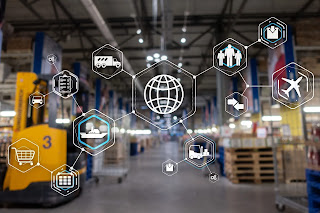Fractal Logistics: AI and the Global Supply Chain
Fractal Logistics: AI and the Global Supply Chain
The integration of Artificial Intelligence (AI) into the global supply chain has revolutionized the field of logistics, introducing new concepts and strategies that improve efficiency, enhance customer satisfaction, and optimize operations. One such concept is fractal logistics, a dynamic approach inspired by fractal geometry principles that enable organizations to navigate the complexities of the modern supply chain with greater precision and adaptability.
Understanding Fractal Logistics:
Fractal logistics is a concept that leverages AI technology to optimize the various interconnected components of the supply chain, from procurement and production to warehousing and distribution. It takes inspiration from the self-repeating patterns found in fractal geometry and applies them to the logistical decision-making process.
By applying AI algorithms and data analytics to analyze the vast volume of data generated across the supply chain, fractal logistics enables organizations to make more accurate forecasts, identify patterns, mitigate risks, and make informed decisions in real-time. This approach allows for improved demand forecasting, efficient inventory management, streamlined transportation routes, and enhanced overall supply chain visibility.
Benefits of Fractal Logistics:
Improved Efficiency: By harnessing the power of AI, fractal logistics helps organizations streamline their operations, reduce costs, and optimize resource allocation. The intelligent analysis of data enables organizations to identify bottlenecks, eliminate redundancies, and maximize the use of available resources, ultimately improving productivity and reducing waste[^1].
Enhanced Customer Satisfaction: Fractal logistics allows organizations to have a holistic view of the supply chain, facilitating improved customer service and satisfaction. AI-driven demand forecasting and inventory management systems ensure that products are available when and where they are needed, reducing stockouts and ensuring timely deliveries[^2].
Supply Chain Resilience: The dynamic nature of fractal logistics enables organizations to quickly adapt and respond to disruptions or changes in the supply chain. By continuously analyzing data and identifying patterns, AI algorithms can anticipate potential problems and suggest alternative strategies or contingency plans, minimizing the impact of disruptions and maintaining operational continuity[^3].
Sustainable Practices: Fractal logistics supports sustainable practices in the global supply chain. By optimizing transportation routes, minimizing fuel consumption, reducing waste, and improving inventory management, organizations can significantly decrease their carbon footprint[^4].
Perspectives on Fractal Logistics:
While fractal logistics offers numerous benefits, it is important to consider diverse perspectives on its implementation.
Workforce Impact: The integration of AI into logistics may raise concerns about potential job displacement. However, it is crucial to recognize that the introduction of AI technologies also creates new job opportunities, particularly in fields such as data analysis and AI programming. Organizations should prioritize reskilling and upskilling programs to empower their workforce to adapt and work efficiently alongside AI systems[^5].
Data Privacy and Security: The extensive use of data in fractal logistics raises questions about privacy and security. It is essential for organizations to implement robust data protection measures, comply with relevant regulations, and ensure ethical AI practices to safeguard sensitive information.
Conclusion:
Fractal logistics, driven by AI technology, is transforming the global supply chain. By leveraging AI algorithms and analytics, organizations can navigate the complexities of the modern supply chain with enhanced accuracy, efficiency, and adaptability. Through improved forecasting, optimized inventory management, and streamlined operations, fractal logistics empowers organizations to meet the demands of a dynamic global market while reducing costs and improving sustainability.
The successful implementation of fractal logistics requires organizations to address workforce concerns, prioritize data privacy and security, and foster a culture of continuous learning and adaptation. By embracing these challenges, organizations can unlock the full potential of AI-powered fractal logistics in the global supply chain.
Sources:
- https://www.sciencedirect.com/science/article/pii/S1877042813035982
- https://www.forbes.com/sites/forbestechcouncil/2021/03/22/how-artificial-intelligence-is-optimizing-logistics-and-the-supply-chain/
- https://www.scmr.com/article/supply_chain_great_expectations
- https://www.supplychaindigital.com/technology-and-ai/ai-and-future-sustainable-logistics
- https://www.mckinsey.com/business-functions/mckinsey-digital/our-insights/the-future-of-work-in-logistics-automation-where-to-next





Comentarios
Publicar un comentario
Thank you for visiting our site and taking the time to leave a comment! We value your opinions and love to receive your feedback. If you have any questions or comments about our prompt examples, please let us know. We strive to continuously improve and provide the best possible content for our visitors. Thanks again for your support, and we look forward to hearing from you soon!